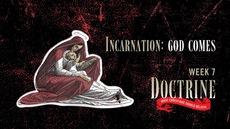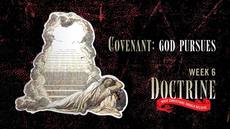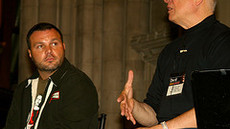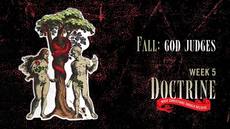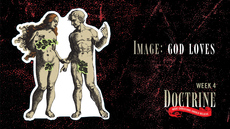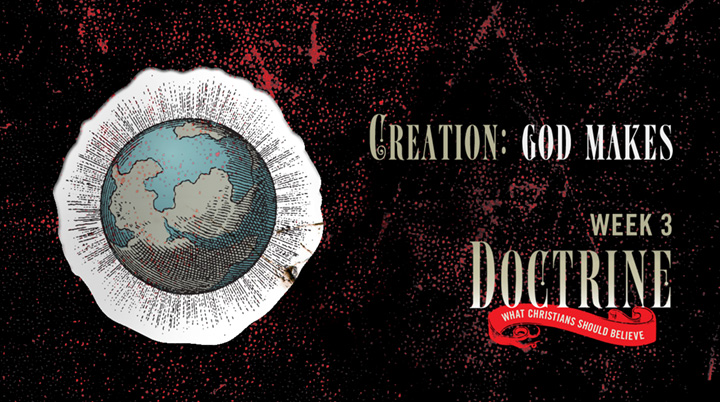
On Sunday, April 13, I spoke on
Creation: God Makes as part of our Doctrine: What Christians Should Believe sermon series. When the series is completed, Dr. Gerry Breshears and I will write the content as a lengthy book for our friends at Crossway and deal with the issues in even greater detail. Until then, this blog will be utilized to serve people who want to study the sermon topics further, including creationism.
Today a debate rages about the question of origins and where creation and humanity came from. Much of the passion that surrounds this question is because the answer has implications for everything else. For example, Genesis says that there was a beginning to history, which means there will be an end. Genesis says that creation comes from God, which means it belongs to God. Genesis says that people come from God, which means that people will stand before God in the end.
Before we jump in, I would like to stress that Genesis was not written as a scientific textbook. Rather, it is a theological narrative written to reveal the God of creation, which means it emphasizes God, not creation. As one example, Hebrews 11:3 says, "By faith we understand that the universe was created by the word of God, so that what is seen was not made out of things that are visible."
The Bible in general, and the opening pages of Genesis in particular, are far more concerned with the questions of who made creation, how he made creation, and why he made creation than when he did. Therefore, as Galileo said, "the Holy Ghost intended to teach us how to go to heaven, not how the heavens go."
Therefore, at Mars Hill we want to be clear that there is a distinction between debates within Christian theology and debates that are not Christian. For example, godly Bible-believing and Jesus-loving people can and should graciously debate and discuss what Genesis 1 and 2 mean without viewing one another in the same light as non-Christians who hold to naturalistic and atheistic evolution. This is because there is an enormous difference between discussing what the Bible says and ignoring it altogether.
Among Bible-believing, Jesus-loving Christians, there are at least six primary interpretations of the creation account in Genesis 1–2. Among the elders at Mars Hill, most of us find the first two positions to be the most persuasive biblically. Yet, we would like to stress that our Christian brothers and sisters who hold the other views listed below are welcome as members of our church. Our only request is that the Christians in our church would not become divisive over this matter or seek to make their view the litmus test for Christian orthodoxy. As Paul says, we now see only in part and one day in Jesus’ presence we will know in full and be in complete agreement on this and all other matters. For the record, I tend to prefer the first view, as promoted by Dr. John Sailhamer whose resources on Genesis are listed at the end of this blog.
View #1 – Historic Creationism
In this view, Genesis 1:1 records the making of all creation by God out of nothing, or "ex nihilo." The merism "heavens and earth" means the sky above and land below, or the totality of creation. Since the word used for "beginning" in Genesis 1:1 is reshit in Hebrew, which means an indefinite period of time, it is likely that all of creation was completed over an extended period of time (anywhere from days to billions of years). Genesis 1:2 begins the description of God preparing the uninhabitable land for the creation of mankind. The preparation of the uncultivated land and the creation of Adam and Eve occurred in six literal twenty-four-hour days, as echoed in Exodus 20:11. This view leaves open the possibility of both an old earth and six literal days of creation.
View #2 – Young Earth Creationism
In this view, God created the entire universe, including Adam and Eve, in six literal twenty-four-hour days. This view is almost always accompanied with a belief in a young earth as it seeks to be faithful to the biblical text while not giving much credence to the scientific claims of such things as an old earth.
View #3 – Gap Theory
In this view, Genesis 1:1 explains a first creation that happened perhaps billions of years ago. Then, a catastrophic event, likely the fall of Satan from heaven, left the earth in the destroyed condition of Genesis 1:2. God responded to this disaster by recreating the earth again a few thousand years ago in six literal days and repopulating the earth as is recorded in Genesis 1:3–27. According to this view the earth is old from the first creation and mankind is young because of the recent creation. The problems with this view include the fact that nothing in the Bible speaks of two creations. Also, at the end of the six days of creation, God declared all that he had made "very good," which does not correlate with the claim that the earth had been destroyed and made "very bad."
View #4 – Literary Framework View
In this view, Genesis 1–2 is intended to be read as a figurative framework explaining creation in a topical, not sequential, order. The six days of creation listed in Genesis 1 are also to be interpreted metaphorically and not as literal twenty-four-hour days. The Literary Framework View is outlined here:
Forming
| Day 1 - light and darkness separated |
Day 4 - sun, moon, stars (lights in heaven) |
| Day 2 - sky and waters separated |
Day 5 - fish and birds |
| Day 3 - dry land and waters separated; plants and trees |
Day 6 - animals and man |
Filling
However, there are some problems with this view. Most obviously, Exodus 20:11 clearly states that the six days of creation are literal; it ties our seven-day week with one day of Sabbath to the six days of God’s work in creation and his one day of rest.
View #5 – Day-Age View
In this view, God created the universe, including Adam and Eve, in six sequential periods of time that are not literal twenty-four-hour days. The problem with this view is that the six days of creation seem to clearly be literal days. Also, as we saw above, Exodus 20:11 clearly states that the six days are literal.
View #6 – Theistic Evolution
In this view, God essentially began creation and then pulled back from working directly in creation to instead work through the process of evolution. The only exception would be God involving himself directly again in the making of human life. For the most part, this view accepts the hypothesis of evolution but seeks to insert God as the creator of matter and overseer of the evolutionary process. This view also believes that species evolved over a long period of time, which requires an old earth.
The biblical problems with theistic evolution are many. First, Genesis 1 repeatedly states that creation and its species came into existence because "God said," and not because of evolutionary process. Additionally, Genesis 1 also continually states that after God commanded creation to come into existence, "it was so"; thus, God’s commands brought about the instantaneous response of creation rather than a long evolutionary process detached from God. Second, evolution teaches that one species evolves into other species while Genesis 1 says that each species had offspring "according to its kind" (e.g., 1:21, 1:24, 1:25) and not another kind as evolution postulates. Third, the rest of Scripture portrays God as continually involved in the details of creation, including making the grass grow (Ps. 104:14; Matt. 6:30), feeding the birds (Matt. 6:26), and feeding other creatures (Ps. 104:21, 25–30). Scripture clearly does not paint God as remote or only indirectly involved in creation.
For Further Study
For those wanting to study the issue of creation further, the following lengthy list of resources is intended to help guide your studies. By listing these resources I am not endorsing every single one but rather offering them as a breadth of perspectives that I have personally studied in an effort to come to my own conclusions about creation.
Detailed Studies of Genesis 1–2
Blocher, Henri.
In the Beginning: The Opening Chapters of Genesis. Downers Grove, IL: InterVarsity Press, 1984.
Sailhamer, John.
Genesis Unbound: A Proactive New Look at the Creation Account. Colorado Springs, CO: Multnomah, 1996.
Commentaries on Genesis
Waltke, Bruce K.
Genesis. Grand Rapids, MI: Zondervan, 2001.
Sailhamer, John H.
"Genesis." In Genesis, Exodus, Leviticus, Numbers. Vol. 2 of The Expositor’s Bible Commentary, edited by Frank E. Gaebelein. Grand Rapids, MI: Zondervan, 1990.
Kass, Leon R.
The Beginning of Wisdom: Reading Genesis. Chicago: University of Chicago Press, 2006.
Brueggemann, Walter.
Genesis. Atlanta: John Knox Press, 1982.
Ross, Allen P.
Creation and Blessing: A Guide to the Study and Exposition of Genesis. Grand Rapids, MI: Baker, 1997.
Calvin, John.
Genesis. Wheaton, IL: Crossway Books, 2001.
Moyers, Bill.
Genesis: A Living Conversation. New York: Broadway Books, 2002.
Books Debating Views of Creation
Hagopian, David G., ed.
The Genesis Debate: Three Views on the Days of Creation. Mission Viejo, CA: Crux Press, 2001.
Moreland, J. P., and John Mark Reynolds, eds.
Three Views on Creation and Evolution. Grand Rapids, MI: Zondervan, 1999.
Books on Creation and Intelligent Design
Strobel, Lee.
The Case for a Creator: A Journalist Investigates Scientific Evidence That Points Toward God. Grand Rapids, MI: Zondervan, 2005.
Dembski, William A.
Intelligent Design: The Bridge Between Science and Theology. Downers Grove, IL: InterVarsity Press, 1999.
Dembski, William A.
The Design Revolution: Answering the Toughest Questions about Intelligent Design. Downers Grove, IL: InterVarsity Press, 2004.
Woodward, Thomas.
Doubts About Darwin: A History of Intelligent Design. Grand Rapids, MI: Baker, 2007.
Witham, Larry A.
By Design: Science and the Search for God. San Francisco, CA: Encounter Books, 2004.
Morris, Henry M.
Scientific Creationism. Green Forest, AR: Master Books, 2000.
Books Critiquing Evolution
Witham, Larry A.
Where Darwin Meets the Bible: Creationists and Evolutionists in America. New York: Oxford University Press, 2002.
Batten, Don, ed.
The Answers Book: The Twenty Most-Asked Questions About Creation, Evolution, and the Book of Genesis Answered. Green Forest, AR: New Leaf Press, 1990.
Johnson, Phillip E.
Darwin on Trial. Downers Grove, IL: InterVarsity Press, 1993.
Ham, Ken.
The Lie: Evolution. Green Forest, AR: Master Books, 1987.
Denton, Michael.
Evolution: A Theory in Crisis. Chevy Chase, MD: Adler & Adler, 1986.
Wells, Jonathan.
Icons of Evolution: Science or Myth? Why Much of What We Teach About Evolution Is Wrong. Washington, DC: Regnery Publishing, 2000.
Johnson, Phillip E.
Defeating Darwinism by Opening Minds. Downers Grove, IL: InterVarsity Press, 1997.
Behe, Michael J.
Darwin’s Black Box: The Biochemical Challenge to Evolution. New York: Free Press, 2006.
Books on Particular Issues Related to Genesis
Ham, Ken, Carl Wieland, and Don Batten.
One Blood: The Biblical Answer to Racism. Green Forest, AR: Master Books, 1999.
Whitcomb, John C., and Henry M. Morris.
The Genesis Flood: The Biblical Record and Its Scientific Implications. Phillipsburg, NJ: P & R Publishing, 1960.
Lubenow, Marvin L.
Bones of Contention: A Creationist Assessment of the Human Fossils. Grand Rapids, MI: Baker, 2004.
Jordan, James B.
Primeval Saints: Studies in the Patriarchs of Genesis. Moscow, ID: Canon Press, 2001.
Johnston, Philip, and Peter Walker.
The Land of Promise: Biblical, Theological, and Contemporary Perspectives. Downers Grove, IL: InterVarsity Press, 2000.
Hubbard, Moyer V.
New Creation in Paul’s Letters and Thought. Cambridge: Cambridge University Press, 2005.
Anderson, Bernhard W. From Creation to New Creation: Old Testament Perspectives. Eugene, OR: Wipf & Stock Publishers, 2005.
Robertson, O. Palmer.
The Genesis of Sex: Sexual Relationships in the First Book of the Bible. Phillipsburg, NJ: P & R Publishing, 2002.
Robertson, O. Palmer.
The Christ of the Covenants. Phillipsburg, NJ: P & R Publishing, 1981.
Books Seeking to Reconcile Science and Scripture
Ross, Hugh.
The Genesis Question: Scientific Advances and the Accuracy of Genesis. Colorado Springs, CO: NavPress Publishing Group, 2001.
Ross, Hugh.
The Creator and the Cosmos: How the Latest Scientific Discoveries of the Century Reveal God. Colorado Springs, CO: NavPress Publishing Group, 2001.
Ross, Hugh.
Beyond the Cosmos: What Recent Discoveries in Astrophysics Reveal About the Glory and Love of God. Colorado Springs, CO: NavPress Publishing Group, 1999.
Schroeder, Gerald.
Genesis and the Big Bang: The Discovery of Harmony Between Modern Science and the Bible. New York: Bantam, 1992.
Colson, Charles W. and Nancy Pearcey.
Science and Evolution: Developing a Christian Worldview of Science and Evolution. Wheaton, IL: Tyndale House Publishers, 2001.
Miller, Kenneth R.
Finding Darwin's God: A Scientist's Search for Common Ground Between God and Evolution. New York: HarperCollins, 2007.
Collins, Francis S.
The Language of God: A Scientist Presents Evidence for Belief. New York: Free Press, 2006.
Books Examining the Foundations of Science
Johnson, Phillip E.
Reason in the Balance: The Case Against Naturalism in Science, Law, and Education. Downers Grove, IL: InterVarsity Press, 1995.
Moreland, J. P.
Christianity and the Nature of Science. Grand Rapids, MI: Baker, 1999.
Morris, Henry M.
The Biblical Basis for Modern Science. Green Forest, AR: Master Books, 2002.
Johnson, Phillip E.
The Wedge of Truth: Splitting the Foundations of Naturalism. Downers Grove, IL: InterVarsity Press, 2002.
Books on the Age of the Earth
Ross, Hugh.
Creation and Time: A Biblical and Scientific Perspective on the Creation-Date Controversy. Colorado Springs, CO: NavPress Publishing Group, 1994.
Stoner, Don.
A New Look An Old Earth: Resolving the Conflict Between the Bible and Science. Eugene, OR: Harvest House Publishers, 1997.
Morris, John D.
The Young Earth: The Real History of the Earth – Past, Present, and Future. Green Forest, AR: Master Books, 2007.
Jordan, James B.
Creation In Six Days: A Defense of the Traditional Reading of Genesis One. Moscow, ID: Canon Press, 1999.
Web Sites on Creation
//www.answersingenesis.org/
//www.icr.org/
//www.christiananswers.net/creation/
//www.discovery.org/csc/
//www.iscid.org/
//www.ideacenter.org/
//www.origins.org/
//www.reasons.org/index.shtml
Videos on Intelligent Design
Icons of Evolution: The Growing Scientific Controversy Over Darwin
Unlocking the Mystery of Life: The Scientific Case for Intelligent Design
The Privileged Planet: How Our Place in the Cosmos is Designed for Discovery On Sunday, April 13, I spoke on Creation: God Makes as part of our Doctrine: What Christians Should Believe sermon series. When the series is completed, Dr. Gerry Breshears and I will write the content as a lengthy book for our friends at Crossway and deal with the issues in even greater detail. Until then, this blog will be utilized to serve people who want to study the sermon topics further, including creationism.
Today a debate rages about the question of origins and where creation and humanity came from. Much of the passion that surrounds this question is because the answer has implications for everything else. For example, Genesis says that there was a beginning to history, which means there will be an end. Genesis says that creation comes from God, which means it belongs to God. Genesis says that people come from God, which means that people will stand before God in the end.
Before we jump in, I would like to stress that Genesis was not written as a scientific textbook. Rather, it is a theological narrative written to reveal the God of creation, which means it emphasizes God, not creation. As one example, Hebrews 11:3 says, "By faith we understand that the universe was created by the word of God, so that what is seen was not made out of things that are visible."
The Bible in general, and the opening pages of Genesis in particular, are far more concerned with the questions of who made creation, how he made creation, and why he made creation than when he did. Therefore, as Galileo said, "the Holy Ghost intended to teach us how to go to heaven, not how the heavens go."
Therefore, at Mars Hill we want to be clear that there is a distinction between debates within Christian theology and debates that are not Christian. For example, godly Bible-believing and Jesus-loving people can and should graciously debate and discuss what Genesis 1 and 2 mean without viewing one another in the same light as non-Christians who hold to naturalistic and atheistic evolution. This is because there is an enormous difference between discussing what the Bible says and ignoring it altogether.
Among Bible-believing, Jesus-loving Christians, there are at least six primary interpretations of the creation account in Genesis 1–2. Among the elders at Mars Hill, most of us find the first two positions to be the most persuasive biblically. Yet, we would like to stress that our Christian brothers and sisters who hold the other views listed below are welcome as members of our church. Our only request is that the Christians in our church would not become divisive over this matter or seek to make their view the litmus test for Christian orthodoxy. As Paul says, we now see only in part and one day in Jesus’ presence we will know in full and be in complete agreement on this and all other matters. For the record, I tend to prefer the first view, as promoted by Dr. John Sailhamer whose resources on Genesis are listed at the end of this blog.
On Sunday, April 13, I spoke on Creation: God Makes as part of our Doctrine: What Christians Should Believe sermon series. When the series is completed, Dr. Gerry Breshears and I will write the content as a lengthy book for our friends at Crossway and deal with the issues in even greater detail. Until then, this blog will be utilized to serve people who want to study the sermon topics further, including creationism.
Today a debate rages about the question of origins and where creation and humanity came from. Much of the passion that surrounds this question is because the answer has implications for everything else. For example, Genesis says that there was a beginning to history, which means there will be an end. Genesis says that creation comes from God, which means it belongs to God. Genesis says that people come from God, which means that people will stand before God in the end.
Before we jump in, I would like to stress that Genesis was not written as a scientific textbook. Rather, it is a theological narrative written to reveal the God of creation, which means it emphasizes God, not creation. As one example, Hebrews 11:3 says, "By faith we understand that the universe was created by the word of God, so that what is seen was not made out of things that are visible."
The Bible in general, and the opening pages of Genesis in particular, are far more concerned with the questions of who made creation, how he made creation, and why he made creation than when he did. Therefore, as Galileo said, "the Holy Ghost intended to teach us how to go to heaven, not how the heavens go."
Therefore, at Mars Hill we want to be clear that there is a distinction between debates within Christian theology and debates that are not Christian. For example, godly Bible-believing and Jesus-loving people can and should graciously debate and discuss what Genesis 1 and 2 mean without viewing one another in the same light as non-Christians who hold to naturalistic and atheistic evolution. This is because there is an enormous difference between discussing what the Bible says and ignoring it altogether.
Among Bible-believing, Jesus-loving Christians, there are at least six primary interpretations of the creation account in Genesis 1–2. Among the elders at Mars Hill, most of us find the first two positions to be the most persuasive biblically. Yet, we would like to stress that our Christian brothers and sisters who hold the other views listed below are welcome as members of our church. Our only request is that the Christians in our church would not become divisive over this matter or seek to make their view the litmus test for Christian orthodoxy. As Paul says, we now see only in part and one day in Jesus’ presence we will know in full and be in complete agreement on this and all other matters. For the record, I tend to prefer the first view, as promoted by Dr. John Sailhamer whose resources on Genesis are listed at the end of this blog.


